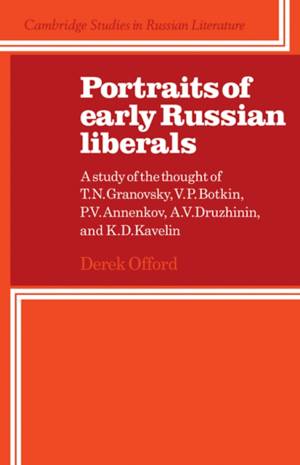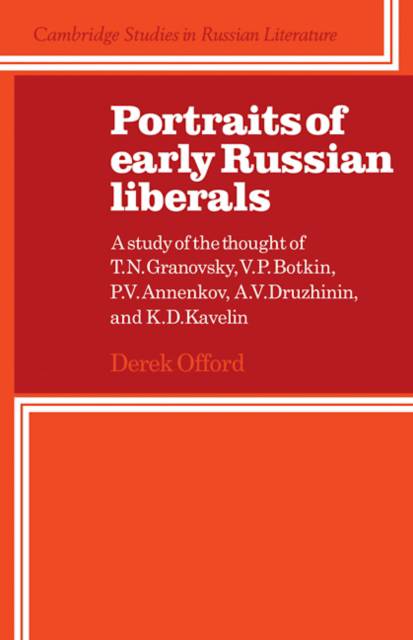
Door een staking bij bpost kan je online bestelling op dit moment iets langer onderweg zijn dan voorzien. Dringend iets nodig? Onze winkels ontvangen jou met open armen!
- Afhalen na 1 uur in een winkel met voorraad
- Gratis thuislevering in België vanaf € 30
- Ruim aanbod met 7 miljoen producten
Door een staking bij bpost kan je online bestelling op dit moment iets langer onderweg zijn dan voorzien. Dringend iets nodig? Onze winkels ontvangen jou met open armen!
- Afhalen na 1 uur in een winkel met voorraad
- Gratis thuislevering in België vanaf € 30
- Ruim aanbod met 7 miljoen producten
Zoeken
Portraits of Early Russian Liberals
A Study of the Thought of T. N. Granovsky, V. P. Botkin, P. V. Annenkov, A. V. Druzhinin, and K. D. Kavelin
Derek Offord
€ 60,95
+ 121 punten
Uitvoering
Omschrijving
This book studies the work of five Russian liberal thinkers who were active in the period 1840-60 against the general background of Russian history, literature and thought in that period. All five thinkers (to each of whom a separate chapter is devoted) played an important part in the flowering of Russian letters in the 1840s, and were involved in the attempt of the intelligentsia, the conscience of the nation, to bring more humane and enlightened values to their backward and semi-feudal country. By the 1850s, when a more radical wing began to emerge in the intelligentsia, the moderation of these liberals became more apparent. While the radicals were prepared to countenance revolutionary upheaval, the liberals counselled patience, toleration, and gradualism. In his conclusion Dr Offord explores the possible reasons for the failure of the liberal tendency, represented by these thinkers, to establish itself properly in Russia.
Specificaties
Betrokkenen
- Auteur(s):
- Uitgeverij:
Inhoud
- Aantal bladzijden:
- 304
- Taal:
- Engels
- Reeks:
Eigenschappen
- Productcode (EAN):
- 9780521111812
- Verschijningsdatum:
- 11/06/2009
- Uitvoering:
- Paperback
- Formaat:
- Trade paperback (VS)
- Afmetingen:
- 140 mm x 216 mm
- Gewicht:
- 385 g

Alleen bij Standaard Boekhandel
+ 121 punten op je klantenkaart van Standaard Boekhandel
Beoordelingen
We publiceren alleen reviews die voldoen aan de voorwaarden voor reviews. Bekijk onze voorwaarden voor reviews.











